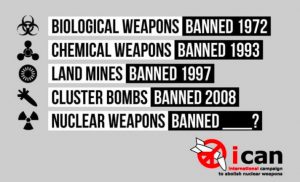
(Editor’s note: Since this discussion was posted, the UN High Level Conference on Nuclear Disarmament has been postponed, perhaps permanently. This appears to be the result of diplomatic pressure from the nuclear weapons states, as described in a more recent article by Alyn War: Nuclear Weapon States’ Long Arm Seen Behind Deferral of Landmark UN Conference).
Here is a response to the question from Alyn Ware. Although Alyn is a leading member of Parliamentarians for Nuclear Disarmament, this is written in his personal capacity, not in the name of the organization.
When a group of countries moved the United Nations General Assembly to commence negotiations on a Treaty on the Prohibition of Nuclear Weapons that only non-nuclear weapons countries supported, a number of the nuclear-armed and allied States announced that such an initiative was a distraction from the real business of nuclear risk-reduction and disarmament which they are actively pursuing in other forums such as the Nuclear Non-Proliferation Treaty (NPT) Review Process.
This argument was fallacious and self-serving.
It was clearly false, as the nuclear-armed and allied States had themselves agreed at the 2010 NPT Review Conference that “All States need to make special efforts to establish the necessary framework to achieve and maintain a world without nuclear weapons.” The non-nuclear States who were advancing negotiations on the Prohibition Treaty were merely doing their part to fulfill this agreement.
And the argument was self-serving, as it aimed to prevent progress on the prohibition of nuclear weapons in order to allow them (the nuclear armed and allied States) to continue indefinitely with their nuclear deterrence policies and practices.
The Prohibition Treaty has now been concluded and opened for signature. A good step, but the nuclear armed and allied States have reaffirmed that they will not join, so it won’t apply to them.
In 2018, there will be another process that could elevate the Prohibition Treaty (including by increasing the number of countries signing), as well as putting pressure on the nuclear armed and allied states to adopt incremental nuclear disarmament measures that will bring them closer to commencing negotiations on nuclear weapons elimination.
This is the UN High Level Conference on Nuclear Disarmament, which aims to build global attention and the necessary political will for nuclear disarmament in the nuclear-reliant States.
Similar UN High Level conferences on other core issues for humanity have been remarkably successful. The Sustainable Development Conference (2015) adopted the Sustainable Development Goals. The Climate Change Conference (2016) adopted the Paris Agreement. The Oceans Conference (2017) adopted the 14-point action plan ‘Our Oceans, Our Future’. The Refugees conference (2016) adopted the New York Declaration. One key aspect which ensured their success was strong cooperative action by civil society.
The 2018 UN High-Level Conference on Nuclear Disarmament has the potential for similar success, but appears thwarted by a lack of support and cooperation amongst civil society. Some of the same disarmament organisations that scorned the nuclear-armed States for calling the Prohibition Treaty a ‘distraction’, are now using those same fallacious arguments to undermine the UN High Level Conference calling it a distraction. To claim that the UN High-Level Conference is a distraction from the Prohibition Treaty is a use of ‘alternative facts’ as Orwellian as those of the US President. Here is a fact check: The President of the UN negotiating conference for the Prohibition Treaty has supported the UN High Level Conference as a way to advance both the ban treaty and incremental measures by nuclear-armed and allied States. Civil society should get on board, and not weaken itself and the nuclear abolition campaign through division.
The manufactured ‘competition’ between nuclear disarmament initiatives is one of the key reasons that the nuclear disarmament movement cannot garner the political traction that has led to success in other areas – such as chemical weapons, biological weapons, cluster munitions and landmines – all of which have prohibition treaties which include (current and former) possessor States, and have been instrumental in changing policies of possessors and destroying actual weapons. If the ban treaty remains stuck in its competitive silo, then it will have next-to-no impact on the States who possess the weapons.
The High-Level Conference provides a forum which can bridge the differences and advance both the comprehensive ban treaty approach, and the incremental measures, i.e. those in which there is a possibility of being adopted by nuclear armed and allied States. Civil society should come in behind this and help make it work.
Nuclear Weapon States’ Long Arm Seen Behind Deferral of Landmark UN Conference
Prague: International youth conference: Reaching High for a Nuclear-Weapon-Free World
World body of parliaments discusses nuclear-risk-reduction and disarmament
United Nations: Reaching HIGH civil society ‘virtual’ conference for nuclear disarmament proposals
Unfold Zero: Making Use of the New Nuclear Ban Treaty
Abolition 2000 Annual Meeting: Supports Women’s March. Calls for Nuclear Risk Reduction
UN commences nuclear abolition negotiations
Civil Society and the UN High Level Conference on Nuclear Disarmament
Banning Nukes: Divergence and Consensus at the UN Working Group on Nuclear Disarmament